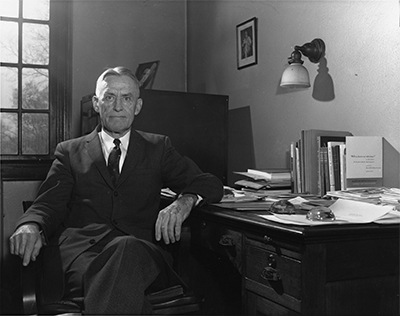John C. Hodges and Writing at Tennessee
The Harbrace, the Library, and the Legacy of John C. Hodges
By Halle Collins (English – Creative Writing ’25)

Throughout the John. C. Hodges library, you’ll hear the rhythmic sound of pencils scratching, the mechanical clicking of a laptop keyboard, footsteps, laughter, and the sight of dozens of bowed heads hunched over laptops, textbooks, or a Starbucks. Everyone on the Knoxville campus knows what the Hodges library is, but most students don’t know who John C. Hodges was, or how much their writing skills benefit from his contributions.
John Cunyus Hodges was hired in 1921 as professor in the English department at the University of Tennessee and became chairman of Freshman English in 1942. Soon after becoming chairman, he implemented a system to help instructors and teaching assistants better manage all 100 sections of Freshman English. When a student received their graded essay back, they put the essay in a folder. At the end of the quarter, they turned in their folders with all their graded papers. Instructors then had to conference with each student at least twice a semester and go over the essays to discuss the student’s weaknesses and methods for improving their writing.
Over time, Hodges noticed many students were making similar technical and grammatical mistakes. Hodges recognized that if these common mistakes could be addressed, student writing could be improved while decreasing the time instructors had to spend grading the papers. He began analyzing the essays from the folders of past students, going over hundreds of papers. Later, in order to expand his study, Hodges won federal funding through which to hire teaching assistants to help collect and study over 20,000 student papers. From this research, Hodges created the first edition of The Hodges Harbrace Handbook, published in 1941.
The Harbrace has remained incredibly successful because it simplifies both the writing process for students and the essay feedback system for instructors. Today, The Hodges Harbrace Handbook is in its nineteenth edition and is published by Cengage Learning. Since its first edition in 1941, it is estimated over 15 million students have used the Harbrace. The contributions of both UT students’ writing and Hodges’ research made the Harbrace possible; they have helped millions of students and teachers for nearly a century.
At Tennessee, the Harbrace plays a large role in students’ studies, especially in their freshman year. All first years at Tennessee have to take a First-Year Seminar (FYS) class to smooth their transition into college. One of the resources they receive is The Hodges Harbrace Handbook. According to Joshua Martin, an instructor of FYS classes, the Harbrace helps students learn how to take their ideas and develop them into college-level essays because, “Abstract thought can be difficult to present in an ordered fashion. The Harbrace provides a structure for effective written communication.” The use of the Harbrace in these classes also helps establish clear rules that allow for cohesive grading criteria for instructors. As Martin says, “The Hodges Harbrace Handbook provides a common arena for agreement on how a paper should look. Academic papers benefit from the tools provided.”
Additionally, John C. Hodges played a key role in establishing the development program at the Hodges library. The library has an online database where students and faculty can access a variety of books for academic use. English Professor Jeffrey Ringer, who conducts research on writing transfer, says, “I make ample use of the library, including the databases and the material. Being able to work in Hodges library and make use of the ample resources they provide have been instrumental in all of the work I have published.”
While Hodges retired in 1962, his impact on this university is still felt to this day. In his time at the University of Tennessee, he recruited talented professors, setting up UT’s English department for success for years to come. His first area of specialization was late seventeenth-century drama. His collection of rare books and first editions, centered on playwright William Congreve, is now in Special Collections. But he also helped develop rhetoric and composition as a field of research. As Ringer says, “Now, at least half a century since Hodges was a faculty member in English, we have on average about seven or eight faculty members whose expertise is in rhetoric, writing, or linguistics. Faculty members who specialize in Rhetoric and Writing Studies help prepare scholars and teachers of rhetoric and writing for future generations.”
Hodges continues to directly impact current students and instructors at Tennessee. Thanks to a substantial bequest and continuing royalties from the Harbrace Handbook, the John C. Hodges Better English Endowment helps to support graduate student fellowships and research assistantships, to fund summer research grants and faculty professional development, to send researchers and students to lectures and conferences, and to fund community outreach programs like the Phillis Wheatley YMCA book club and the TN Flagship Schools College Admissions Essay Tutoring Program.
Works Consulted
- Hawhee, Debra. “Composition History and the Harbrace College Handbook.” College Composition and Communication, vol. 50, no. 3, 1999, pp. 504–23. JSTOR, https://doi.org/10.2307/358863. Accessed 26 Mar. 2023.
- Clark, Brooks. “The Harvard Scholar Whose Grammar Book Built the Library – Speaking Volumes – Features and Fragments from the University of Tennessee Libraries.” Speaking Volumes – Features and Fragments from UT Libraries, 27 Oct. 2017, https://volumes.lib.utk.edu/news/grammar-book-built-the-library/.
- Purdy, Michael. “Best-Selling Grammar, Writing Guide by Late UT Professor Celebrates 70th Anniversary.” News, 21 Dec. 2017, https://news.utk.edu/2012/03/07/hodges-harbrace-guide-70th-anniversary/.
- “Give to English.” Department of English, 25 Sept. 2022, https://english.utk.edu/give/.
- Creekmore, Betsey B. “Hodges, John Cunyus.” Volopedia, University of Tennessee Libraries, 8 Oct. 2018, https://volopedia.lib.utk.edu/entries/john-cunyus-hodges/.
- Curry, Kenneth, and Kenneth Curry. “Post-War Growth: The Hodges Years: 1945-1962.” English at Tennessee, 1794-1988, Dept. of English, the University of Tennessee, Knoxville, 1989, pp. 67–92.